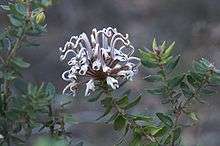Grevillea buxifolia
Grevillea buxifolia, commonly known as the grey spider flower, is a species of the family Proteaceae. It grows in coastal New South Wales, Australia. First described in 1793 by James Edward Smith, he gave the new species the name Embothrium buxifolium. It is widely cultivated and contains a number of subspecies and cultivars. These vary most in the presentation of the attractive flower.
The species forms a short shrub, three or four feet high. The numerous branches are covered in a reddish or brown hair and many leaves. Flowers sit at the termination of these: yellowish and white, pendulous star-shaped petals, set to appear in November.
The flowers of the plant sit alone, erect in umbels, on stalks covered in reddish brown hairs. The corolla is likewise clothed and is partly fused to form a cavity. This interior is white and the petals are otherwise very pale to yellow; this spills above the hairy parts. The single elliptic leaves are veiny, with a very rough dark green upper; margins entire and roll to the downy underside. These are arranged, almost directly to the stem, alternate and numerous up the branches. They end in a little sharp point.
References
- "Grevillea buxifolia". Plant Name Details. IPNI. Retrieved 2007-07-29.
Basionym: Proteaceae Embothrium buxifolium Sm. Spec. Bot. New Holland 1793
- "Grevillea buxifolia". Grevillea page. (ASGAP). 14 February 2006. Retrieved 2007-08-01.
G.buxifolia subsp. buxifolia and subsp. phylicoides are both well known in cultivation and are generally reliable and attractive shrubs
External links
 |
Wikisource has original text related to this article:
|
 |
Wikisource has original text related to this article:
|
